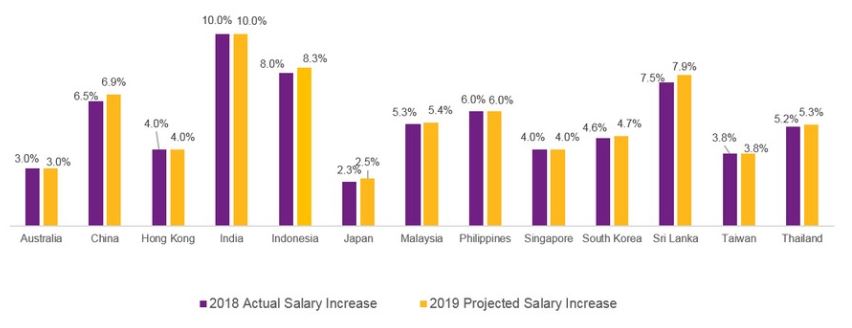India to witness 10% pay hike in 2019, the highest in APAC: Report

Same as the actual salary increase in 2018, pay in India is expected to rise at 10 percent as per the latest Q3 2018 Salary Budget Planning Report released by Willis Towers Watson. While the projected salary increase for the country is stabilized, it is the highest in APAC, followed by Indonesia at 8.3 percent and Sri Lanka at 7.9 percent.
Countries like Australia, Japan, and Singapore will see a fairly low increment in pay at 3 percent, 2.5 percent and 4 percent respectively.
As per the report, the high salary increments in India can be attributed to the steady economic growth, progressive reforms and cautious optimism across sectors. However, Sambhav Rakyan, Data Services Practice Leader, Asia Pacific, Willis Towers Watson says that workplace automation, artificial intelligence, and robotics are expected to reshape a new combination of work, talent, skills requirements, and work relationships.
He adds, “Organizations, therefore, should re-examine not just their talent strategies but also how they will remunerate and reward the workforce of the future.”

Source: Willis Towers Watson
The report further highlights that about 42.6 percent of the total salary increment budget is dedicated to top or above average performers.
It states that on average, 17 percent of the salary increase budget is being allocated to top performers, which covers about 13.1 percent of employees in India. This implies that for each $1 allocated to an average or below-average performer, $1.31 is allocated to a top performer.
Arvind Usretay, Director, Rewards, Willis Towers Watson India, believes that the approach of depending heavily on base pay to drive performance and differentiation will likely be under pressure going forward, as the demand for sharper linkage between performance and pay grows further.
He explains, “The future of work is rapidly creating demand for niche and specialized skills, pushing companies to reevaluate their total rewards programs. Companies in India also depend heavily on base pay to drive performance and differentiation. This approach will likely be under pressure going forward, as the demand for sharper linkage between performance and pay grows further.”
Top 4 areas of recruitment
As per the report, the most critical function in the next 12 months will be Technical Skilled Trade (48 percent). For instance, as the Auto industry gears up to the Government push for electronic (green) vehicles, the demand for Li-Ion battery engineers continues to increase.
The other functions which will be in demand are Engineering (45%), IT (39%) and Marketing (15%).
“In the high-tech industry, demand for specific IT skills such as Machine learning, DevOps, UI/UX, Blockchain is expected to grow at the cost of generic skills,” shares Arvind.
Salary trend across levels
While the median salary increase for 2019 at Executive level is projected at 9.8 percent, the salary hike for mid-management will be around 10 percent.
On the aspect of variable pay allocation, the report projects a decline across levels for 2019, with executive level variable pay declining from 20.7 percent to 17.4 percent, mid-management level from 12.6 percent to 10.2 percent and production/manual labour from 9.2 percent to 8.4 percent.
Salary trend across sectors
The Pharmaceuticals sector has the highest projected salary increase for 2019 at 10.3 percent, followed by consumer products and retail sector at 10 percent. This increase in pay can be attributed to the green shoots of recovery in the sector’s performance, increasing consumer confidence and purchasing power. Despite of the leadership challenges surrounding financial services sector, Banks, NBFCs and Insurance companies have seen a steady increase from 9.1 percent in 2017 to 9.6 percent for 2019, largely due to improved performance, higher premium collections for insurance companies and regulatory reforms.
Going forward aligning the compensation strategy with immediate employee expectations around pay transparency and pay equity will remain key focus areas for companies. Besides providing increments in pay, companies would need to relook at their complete rewards strategy to ensure talent retention and improve talent acquisition.
Sambhav says, “Organizations can respond to this challenge by aligning their compensation strategy with immediate employee expectations around pay transparency and pay equity. Today, employers want employees to understand the spirit and basis of their pay programs and on the other hand, employees expect to be competitively paid.”















